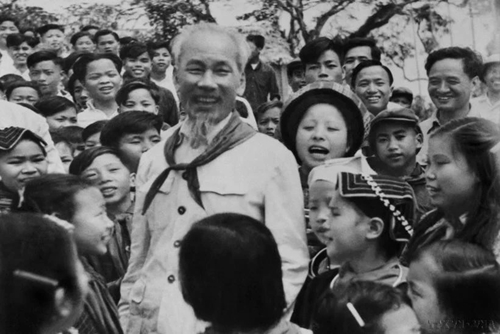President Ho Chi Minh once dreamed of a prosperous, resilient Vietnam standing shoulder to shoulder with the world’s powers. Today, that vision is closer to reality. Five decades after national reunification, Vietnam is pursuing its goal of becoming an upper-income developed nation by 2045 – the centenary of its founding.
    |
 |
|
President Ho Chi Minh visits the Viet Bac Boarding School for Ethnic Minority Children in Thai Nguyen on March 13, 1960. |
Cambodian scholars have expressed strong confidence in Vietnam’s development path, attributing its achievements to sound leadership, national unity, and the lasting legacy of President Ho Chi Minh – a global cultural icon and prominent figure in both national and international workers’ movements.
Uch Leang, Acting Director of the Department of Asia, Africa and the Middle East at Cambodia’s Institute of International Relations, said Ho Chi Minh’s vision of a unified, prosperous and beautiful Vietnam continues to shape national policy, particularly the steadfast defense of sovereignty and territorial integrity - a tribute to generations of Vietnamese patriots.
He highlighted Vietnam’s economic strides in 2024, including GDP growth exceeding 7%, total GDP surpassing 476 billion USD, and per capita income reaching 4,700 USD.
Vietnam’s expanding global presence also drew praise. Vietnam has maintained diplomatic ties with 194 countries and territories, including 13 comprehensive strategic partners, while reinforcing its role as a friend and a reliable partner in the international community.
According to Leang, Vietnam’s deepening global integration has helped build a favorable environment for development, enhancing its international standing.
He pointed to two key drivers of progress: visionary, adaptable leadership committed to Ho Chi Minh’s path, and the Vietnamese people - diligent, innovative, and deeply dedicated to national development.
Sharing this view, Dr. Chheang Vannarith, Deputy Secretary-General of Cambodia’s National Assembly, commended Vietnam’s modernization efforts, socio-economic gains, and success in international integration.
Having studied and travelled extensively in Vietnam, he noted rapid improvements in infrastructure and living standards across both urban and rural areas. He said Vietnam has the potential to join the G20.
Dr. Vannarith stressed that such achievements would not be possible without the strategic and flexible leadership of the Communist Party of Vietnam.
Ultimately, he said, Vietnam’s greatest strength lies in its people. With the combination of human capital and visionary leadership, Vietnam is well-positioned to achieve its development goals.
Source: VNA